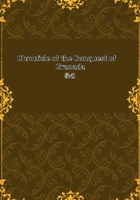
第57章
The valiant Roderigo Ponce de Leon, marques of Cadiz, was one of the most vigilant of commanders. He kept in his pay a number of converted Moors to serve as adalides, or armed guides. These mongrel Christians were of great service in procuring information. Availing themselves of their Moorish character and tongue, they penetrated into the enemy's country, prowled about the castles and fortresses, noticed the state of the walls, the gates, and towers, the strength of their garrisons, and the vigilance or negligence of their commanders. All this they minutely reported to the marques, who thus knew the state of every fortress upon the frontier and when it might be attacked with advantage. Besides the various town and cities over which he held feudal sway, he had always an armed force about him ready for the field. A host of retainers fed in his hall who were ready to follow him to danger, and death itself, without inquiring who or why they fought. The armories of his castles were supplied with helms and cuirasses and weapons of all kinds, ready burnished for use; and his stables were filled with hardy steeds that could stand a mountain-scamper.
The marques was aware that the late defeat of the Moors on the banks of the Lopera had weakened their whole frontier, for many of the castles and fortresses had lost their alcaydes and their choicest troops. He sent out his war-hounds, therefore, upon the range to ascertain where a successful blow might be struck; and they soon returned with word that Zahara was weakly garrisoned and short of provisions.
This was the very fortress which, about two years before, had been stormed by Muley Abul Hassan, and its capture had been the first blow of this eventful war. It had ever since remained a thorn in the side of Andalusia. All the Christians had been carried away captive, and no civil population had been introduced in their stead. There were no women or children in the place. It was kept up as a mere military post, commanding one of the most important passes of the mountains, and was a stronghold of Moorish marauders. The marques was animated by the idea of regaining this fortress for his sovereigns and wresting from the old Moorish king this boasted trophy of his prowess. He sent missives, therefore, to the brave Luis Fernandez Puerto Carrero, who had distinguished himself in the late victory, and to Juan Almaraz, captain of the men-at-arms of the Holy Brotherhood, informing them of his designs, and inviting them to meet him with their forces on the banks of the Guadalete.
It was on the day (says Fray Antonio Agapida) of the glorious apostles St. Simon and Judas, the twenty-eighth of October, in the year of grace one thousand four hundred and eighty-three, that this chosen band of Christian soldiers assembled suddenly and secretly at the appointed place. Their forces when united amounted to six hundred horse and fifteen hundred foot. Their gathering-place was at the entrance of the defile leading to Zahara. That ancient town, renowned in Moorish warfare, is situated in one of the roughest passes of the Serrania de Ronda. It is built round the craggy cone of a hill, on the lofty summit of which is a strong castle. The country around is broken into deep barrancas or ravines, some of which approach its very walls. The place had until recently been considered impregnable, but (as the worthy Fray Antonio Agapida observes) the walls of impregnable fortresses, like the virtue of self-confident saints, have their weak points of attack.